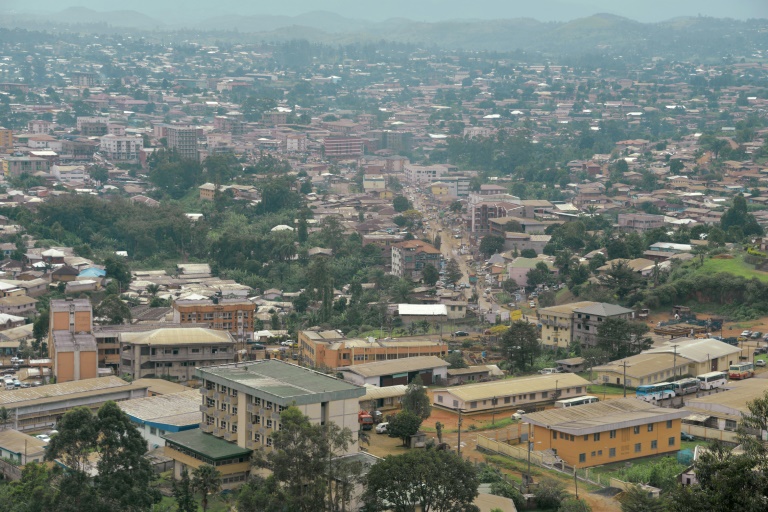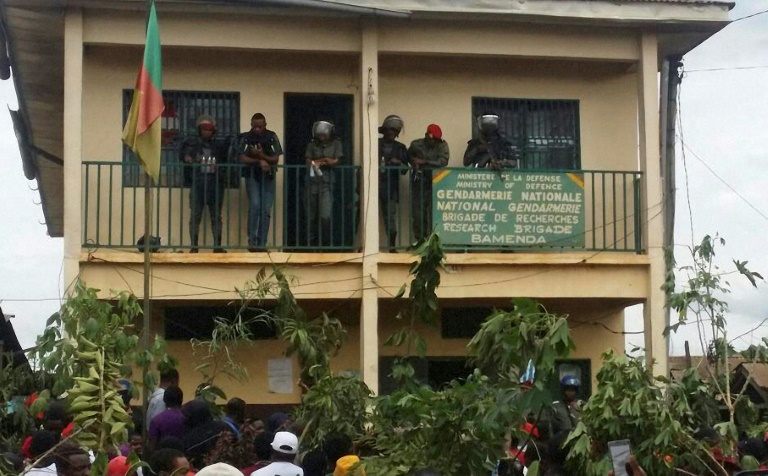It's only 8pm, but in the bars by the Hospital Roundabout, one of the liveliest nightspots in Bamenda, thoughts are already turning to last orders.
“We respect the curfew, we’re going to close soon,” a waitress warns grumbling clients who would rather drink on into the night as of old, despite a police crackdown triggered by sporadic bombings, arson and killings.
Bamenda, a city of about 300,000 people nestled in the mountains of western Cameroon, is the epicentre of an escalating crisis.
At its source is resentment among Cameroon’s English-speaking minority, angry at perceived discrimination at the hands of the country’s francophone majority.
Frustration, for some, has spiralled into violence. And attacks by suspected secessionists demanding independence for the anglophone regions are meeting a tough response.
The authorities imposed the 10pm-to- 5am curfew on November 8 after three paramilitary police were murdered. The curfew has been imposed until November 23, according to the announcement.
A fourth gendarme was later killed and four homemade bombs exploded around the city at the start of this week, although nobody was hurt.
One bomb went off at Hospital Roundabout, the third blast at the busy road junction in recent months.
As the fateful hour draws near, the bars empty and straggling customers take taxis for home, wary of attracting the attention of security forces openly accused of arbitrary arrests and extortion by residents.
– ‘Avoid trouble’ –
Behind choking clouds of smoke from their roadside braziers, street food vendors rush to sell off the last of their cooked fish and meat.
“We have to be quick and leave to avoid trouble with the police,” says Viviane, a vendor whose fish are still neatly laid out over glowing coals.

Bamenda is the main city of Northwest Region, one of two anglophone regions where unrest has broken out. The two regions were once administered by Britain as the Southern Cameroons, but joined Cameroon after it gained independence from France in 1960
“We prepare fewer fish now. We start early to finish early, by 9:30 at night at the latest,” adds the young woman, who dislikes “living in fear because of the insecurity”.
The security situation has deteriorated in the Northwest Region, where Bamenda is the capital, and in the Southwest Region, during the past year. These onetime British protectorates account for about 20 percent of the country’s population.
The greater part of modern-day Cameroon was ruled by France after Germany lost its colonies in Africa following after defeat in World War One.
Violence has become a frightening feature of daily life. Arson attacks on shops and schools, home-made bombings and arrests have escalated into targeted killings.
Some secessionist leaders in exile follow the example of “Comrade” Ayaba Cho Lucas, calling openly for “combat” as “a response to the bullets and the contempt of the occupier… (while) the world remains silent”.
– ‘No reconciliation is possible’ –
In Bafut, a separatist bastion about 20 kilometres (12 miles) from Bamenda, four rooms in a dormitory at the Presbyterian School of Science and Technology were burned down on Tuesday. It was also at a checkpoint near Bafut that one of the four slain gendarmes lost his life last week.

In September, protestors gathered outside a police station in Bamenda to demonstrate against perceived discrimination by the francophone majority. Anglophone grievances centre on education, the law and economic disparity
Virtually nobody in Bamenda has anything to say about the fate of these troopers, but many denounce persistent “oppression” by the security forces.
“They smash their way into homes to arrest people,” claims the owner of a hardware store.
“Even when you’ve done nothing, they take you to the station whether you have an identity card or not. If you pay, they set you free. If you don’t, they keep you.”
Other residents told similar tales of extortion by the security forces.
Clarkson, another resident, was just passing through the Hospital Roundabout district to buy a few kebabs and then “go home fast to avoid being picked up.”
The police “can arrest you now (before the curfew starts) but write on the charge sheet that you were arrested at midnight,” he says.
“I live in fear, I feel insecurity because the police who should protect us are aggressive instead.”
During the day at the Food Market, one of the big markets in Bamenda, the drivers of motorbike taxis are on edge. Journalists are suspect and the sight of a camera arouses immediate hostility.
Inhabitants say that individuals are being arrested more and more frequently on the strength of simple denunciations, rousing the anger of the population.
Police and gendarmes have multiplied the number of checkpoints and nightly patrols, along with raids in districts that supposedly shelter radicals, with their lot of searches and arrests.
The upsurge in violence appears to have pushed many people in Bamenda towards the separatist cause, more radical than the previous demands for broad autonomy by politicians from the west.
“No reconciliation is possible,” one resident says. “We want separation.”






